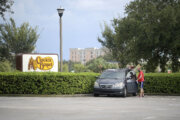ROME (AP) — The woman whose company was linked to thousands of pagers that exploded in Lebanon and Syria in an attack on Hezbollah this week has received unspecified “threats” in the days since and has been advised by the Hungarian secret services “not to talk to media,” her mother told The Associated Press on Friday.
Beatrix Bársony-Arcidiacono said by phone from Sicily that her daughter, Cristiana Bársony-Arcidiacono, “is currently in a safe place protected by the Hungarian secret services” after her Budapest-based company was linked to the devices used in the simultaneous pager attack on Tuesday.
Hungary’s Special Service for National Security disputed the claim, though, saying the younger Bársony-Arcidiacono doesn’t qualify for such protection but noting that she has been interviewed “several times” since an investigation was launched Wednesday.
“The results of the investigation so far have made it clear that the so-called pagers have never been on Hungarian territory, and that no Hungarian company or Hungarian expert was involved in their manufacture or modification!” the agency told the AP in an email.
Cristiana Bársony-Arcidiacono hasn’t appeared publicly since attacks Tuesday and Wednesday targeted pagers and then walkie-talkies in Lebanon, killing at least 37 people and wounding more than 3,000, including civilians. Hezbollah and the Lebanese government have blamed Israel, which has neither confirmed nor denied involvement.
Cristiana Bársony-Arcidiacono is listed as the CEO of Budapest-based BAC Consulting, which the Taiwanese trademark holder of the pagers said was responsible for the manufacture of the devices.
Her mother, though, told the AP that her daughter was “not involved in any way” in the deadly plot to turn the pagers into explosive devices, and that “she was just a broker.”
“The items did not pass through Budapest. … They were not produced in Hungary,” she said, echoing a Hungarian government claim from earlier in the week.
Beatrix Bársony-Arcidiacono didn’t immediately respond to follow-up inquiries about the discrepancy over whether her daughter was under the protection of the Hungarian government.
A Taiwanese firm, Gold Apollo, said it had authorized BAC Consulting to use its name on the pagers that blew up, but that Hungarian company was responsible for their manufacturing and design.
BAC Consulting shares the ground floor of a modest building in Budapest with numerous other enterprises, but has no physical offices and uses the property in Hungary’s capital — like the other companies based there — only as an official address, according to a woman who emerged from the building earlier this week and refused to be named.
The company’s website said it specialized in “environment, development, and international affairs.” The corporate registry listed 118 official functions including sugar and oil production, retail jewelry sales and natural gas extraction.
The company brought in $725,000 in revenue in 2022 and $593,000 in 2023, according to the company registry. Last year, the company spent nearly $324,000, or around 55% of its revenue, on “equipment.”
The company’s website has been offline since Wednesday.
Beatrix Bársony-Arcidiacono said her daughter was born in Sicily and studied at the University of Catania before pursuing a Ph.D. in London. She worked in Paris and Vienna before moving to Budapest in October 2016 to care for her grandmother.
In May 2022, she incorporated BAC Consulting.
On social media, the younger Bársony-Arcidiacono describes herself as a strategic adviser and business developer who has worked for major international organizations as well as for venture capital firms. Her company’s website said she has a doctorate in physics.
The 49-year-old received the degree from University College London, where she was enrolled in the early to mid-2000s, according to her LinkedIn page. There, she worked with Ákos Kövér, a Hungarian physicist and now-retired professor, who confirmed her enrollment.
Kövér said in an email to the AP: “At the time, we also published some joint articles. I am not aware of her other activities.”
She interned at the International Atomic Energy Agency in 2008 and 2009, as confirmed by the agency, and once co-authored a paper for a UNESCO conference discussing the management of underground water.
She speaks English, French, Italian and Hungarian, according to her social media, where she has occasionally made comments criticizing Ukraine or in support of children in Gaza.
___
Spike reported from Budapest and El Deeb reported from Beirut.
Copyright © 2024 The Associated Press. All rights reserved. This material may not be published, broadcast, written or redistributed.





